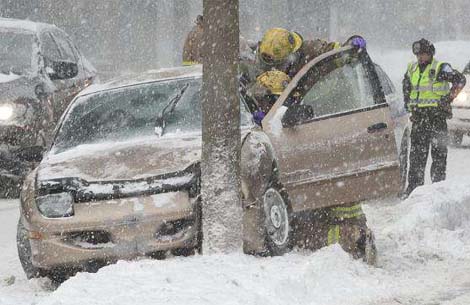
Why there's no such thing as a car 'accident'
A lot of people believe that lack of intent means more than it does. Think about it: if I intended to jump the curb and kill you and your dog while I was sending a text, that would make me a sociopath, but the fact I didn’t mean to do it does not make it an accident.
Driving instructor Candace Calder agrees. “Instead of setting the scenario for awareness and what-ifs, to prevent the whole lead up to the event, drivers tend to think of themselves as the unfortunate victim of circumstances.” When do we stop wanting to let people be victims? When we are the wronged party. Watch how vociferously someone will blame another in the event of a crash, and listen to phrasing. “I got rear-ended by some moron,” is common; “I caused a crash when I ran a red light,” less so. More likely? “I was in an accident.”
And the media helps them feel absolved. We often read that a “tragic accident” has claimed someone’s life. That description is half right. Some outlets use the words crash and accident interchangeably; others weigh the words. Some will say a truck lost control. Trucks don’t lose control; drivers lose control. I think it’s odd you never read about a plane accident.
A recent horrific event in London, Ont., resulted in the death of a young girl and her sister, delivered via emergency C-section as her pregnant mother and another sister lay in hospital. As they exited a store, a car in reverse bashed through two pillars into the front doors. Charges of criminal negligence causing death and criminal negligence causing injury were laid. I didn’t find a single headline that called this an accident even before those charges were laid. They got it right, in the face of tragedy.
Words matter, and it’s time to scrub the word accident from our reporting when it comes to car crashes. Or collisions. There is driver error and there is mechanical failure and there are sudden health issues. Outside of those, or a meteor landing on your hood, that’s about it. It might seem like that snowstorm caused your accident, but ask any first responder or cop the number one problem in a winter “accident” and they’ll tell you speed. The snow isn’t obligated not to land on the road but you are obligated to adjust your driving according to the conditions, up to and including not driving at all.
Says Calder, “I remember some classic excuses: the tree appeared out of nowhere, the other car wasn’t there when I looked, the car suddenly went out of control, or there was ice so it wasn’t my fault. As long as people can absent themselves from the equation, or believe that there was nothing they could do to avoid the event, they are going to think of it as an accident. That way they don’t have to accept the awful responsibility or fault for the sometimes tragic event.”
No-fault insurance exists in every Canadian province. There are subtle differences in how it’s applied, but the reasoning behind it is pretty basic: if you’re involved in a reportable situation each participant is paid out by their own company. The confusing part? Fault is absolutely attributed and applied, but the very terminology – no-fault – lends itself to a dereliction of responsibility. Even if a deer hits you – surely a random accident by nature and definition – it’s a comprehensive claim, like vandalism or theft or fire.
A few months ago, I scratched the lower valence on a car I was driving when I misjudged a curb. In 33 years of driving, I’ve never done that, but it still wasn’t an accident; I was an idiot. When I’m behind the wheel my decisions dictate the outcome of the ride. If I make the right choices and cross paths with someone who doesn’t, the resulting fallout is not an accident; 99 times out of a 100, it could have been prevented.
The only exception I might have to my own rule? Sudden whiteouts. Unexpected weather patterns that send chaos onto a roadway with zero warning. I’ve never experienced one, and like all other armchair commentators I like to think I’d be able to get off the road, but after watching a video like this one, from a traffic cam in the U.S., I’d have to wonder whether being able to do the right thing would make much of a difference.
Calder makes a good point. “I wonder if it’s a self-fulfilling prophecy. The media report the event in a passive fashion to avoid casting blame on legal grounds (reporting of the event happens early in the evidence gathering and blame apportioning process), so maybe the general public has learned to think this way, too.”
We have to stop letting ourselves off the hook.







